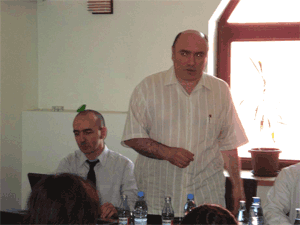 Nona Suvariani, Tbilisi
Nona Suvariani, Tbilisi
Every year nearly 150 thousand people need palliative treatment. Although the number is still high for Georgia, this direction within the healthcare system has not been developed in our country. Specialists discussed the problems and achievements of the palliative treatment in Georgia at the closing ceremony of the Program - “Media Support”.
According to health conditions the population is divided in three groups: healthy people, sick people who can be cured and people who cannot be cured. Consequently, the healthcare system should develop in three directions-preventive, curative and palliative; the latter is designed for the terminally ill or very sick people who are unable to be cured. Such patients are those who suffer from HIV/AIDS, its complications, illnesses of bone, muscles and the nervous system, such as Parkinson disease.
Soso Abesadze, the director of the Center for OncoPrevention, spoke about the main goals of the palliative treatment program:
“When a person has life threatening disease there must be palliative institution that will be able to assist him/her. The palliative treatment is based on team-principles. There is pain that cannot be overcome by any sort of narcotics, or when there is heartache that starts when a person learns that s/he is sick with a terminal illness. However, that must not be the final information for the sick person. We should be in the position to offer them our assistance regardless of the severity of the terrible illness.”
Dimitri Kordzaia, Coordinator of the National Program for Palliative Treatment existing with the Health Committee of the Georgian Parliament, founder and Vice-President of the “Humanists’ Union, Association for Palliative Treatment, stated that nearly 25 thousand people suffer from cancer in Georgia. Moreover, the World Health Organization estimated 75 thousand people (among them family members of the people sick with cancer) are in need palliative treatment. In addition, there are nearly 150 000 people in Georgia who can benefit from methods of palliative treatment.
“It is high figure. Thus, society should not deny the necessity of medical and spiritual assistance. If this direction is eliminated from the healthcare system, it will be difficult to address the spiritual needs in a complete approach. Unfortunately, however, this system has not been well-organized in Georgia and it is only now starting to develop.”
Dimitri Kordzaia stated that palliative treatment does not provide only medical assistance but it also aims to assist patients in dealing with psychological needs. These people need spiritual assistance as well and the involvement of religion is very important.”
Evidently, the people who are subjected to palliative treatment, the most important task is to kill the pain. As a rule, the pain is not killed adequately, and it is connected with opium based drugs not only with analgesics as well. Consequently, the knowledge of doctors is not enough only. There should also be a corresponding legislative base in place.
Georgia has already introduced some amendments to four laws: the Law on Healthcare; the Law on Medical Activities; the Law on the Rights of Patients and the Law on the Usage of Psychotropic Substances, Precursors and Narcological Assistance.”
“The law admitted that palliative treatment is an important component of the healthcare system. Narcotics were delivered in our country in illegal forms and to varying amount. The majority of such drugs were used for injection while pills were needed to kill pain. Injection form is more dangerous and might result into a patient becoming addicted to a controlled substance.”
Dimitri Kordzaia stated that the already introduced amendments are not enough. It is necessary to improve the knowledge of doctors. Implemented survey demonstrated that their knowledge cannot comply with any estimated norms. The problem is that higher educational institutions only recently started teaching of palliative treatment methods. An additional fault of the system is that commissions are being set up to evaluate the level of pain. However, the pain is subjective issue and commissions cannot adequately assess it.
Pati Dzotsenidze, representative of the International Pain Policy Fellowship, speaks about the cases when a dying person is unable to access pain-killers.
“It will take long time before the system starts working, as such we might remove all legal obstacles. However, in isolation that is still not enough. A person does not know that s/he has right not to suffer from pain. There are instances when doctor are not prescribing adequate dosage of medicine for their patients. In some instances doctor are just afraid of being too liberal with medicines. Often a relative of the sick person buy narcotics illegally to overcome the severe pain of their loved ones”
The support of the society is also very important and journalists should also be involved with the process.
Dimitri Kordzaia: “If a person has HIV/AIDS and hides it from the society because s/he fears people would not support him it might have negative reaction on public opinion. The ill person might turn into biological time bomb. For example, a person sick with AIDS will hear an announcement where blood is requested and s/he might give the blood. S/he thinks if you do not like me, let you also suffer like me.”
Recently some positive changes have been implemented in the field. National Program for Palliative Treatment started functioning within the Health Committee of the Georgian Parliament. New resolutions are drawn up, which included the setting of standards for pain killers. Faculties of palliative treatment were opened at the Tbilisi Javakhishvili State University and Tbilisi Medical University. Such a faculty will also be opened in Batumi University. There is only one mobile team in Tbilisi and one hospice in existence, which is a kind of medical institution where people have access to palliative treatment methods. The project of Palliative Treatment for the People Infected with Aids is currently being implemented by the Global Fund. However, it is not enough because palliative treatment should cover all regions of Georgia.



